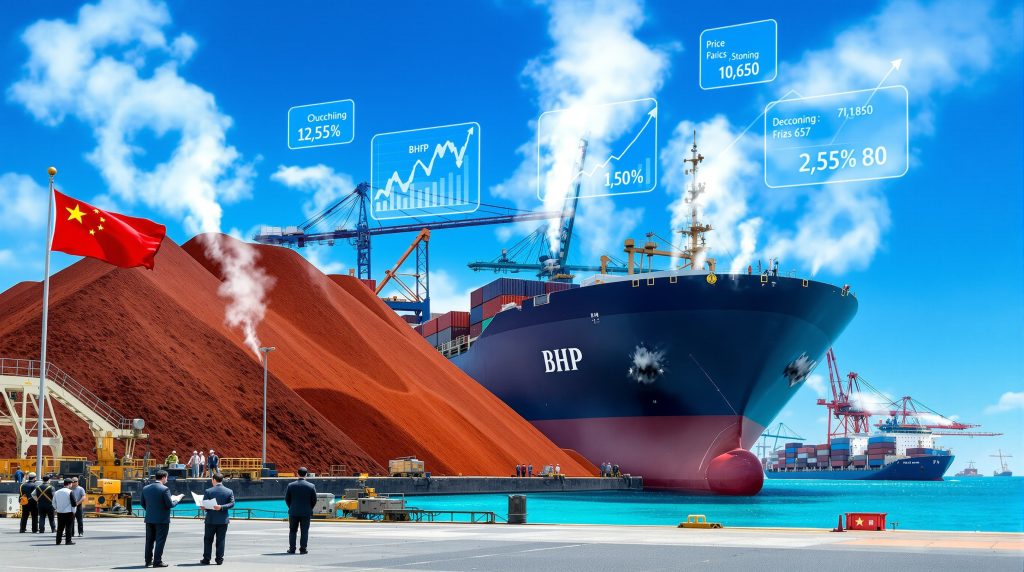China's State Iron-Ore Buyer Shifts Strategy: BHP Cargoes for Sale Amid Negotiation Tactics
China Mineral Resources Group (CMRG), established in 2022 to centralize iron-ore purchasing for Chinese steelmakers, has begun offering multiple BHP iron-ore cargoes for sale amid what appears to be a strategic negotiating stance rather than a comprehensive import ban. This development signals an evolution in China's approach to managing critical supply chains and leveraging its collective buying power.
According to market intelligence, CMRG's Shanghai branch recently offered eight cargoes of BHP iron-ore totaling approximately 1.14 million tons to domestic steelmakers following China's week-long national holiday. At least one 170,000-metric-ton cargo was sold to a Chinese trader in a dollar-denominated transaction, demonstrating that trade channels remain functional despite ongoing tensions in specific product categories.
The strategic offering of these cargoes comes amid industry speculation about potential restrictions on certain BHP products, particularly as CMRG works to establish favorable terms in ongoing contract negotiations. However, the selective nature of these restrictions suggests a calculated commercial approach rather than politically motivated trade barriers.
Understanding China's Evolving Iron-Ore Purchasing Strategy
China's iron-ore purchasing strategy is undergoing a significant transformation with CMRG at the center of this evolution. As the world's largest steel producer, China accounts for approximately 50% of global crude steel production and imported 1.068 billion tonnes of iron ore in 2023—a 6.6% increase from the previous year according to the General Administration of Customs of China.
The relationship between China's steel industry and global mining giants has entered a new phase with CMRG's centralized purchasing power. Recent iron ore price trends reveal:
- Multiple BHP cargoes made available through CMRG's distribution channels
- Selective restrictions on specific product lines like Jimblebar fines
- Continued trading of other BHP iron-ore grades with CMRG's authorization
- Dollar-denominated transactions maintaining international trade norms
This approach demonstrates a sophisticated strategy that applies pressure on specific product categories while maintaining overall trade relations. By targeting certain products rather than implementing comprehensive bans, CMRG can exert influence on pricing and terms while avoiding significant market disruption.
The Strategic Role of CMRG in China's Resource Security
CMRG's establishment represented a significant shift in China's approach to securing critical raw materials. By centralizing purchases that were previously fragmented across numerous steel producers, China created a powerful entity capable of negotiating more favorable terms with major suppliers like BHP, Rio Tinto, and Vale.
This centralized approach serves multiple strategic objectives:
- Strengthens China's bargaining position in price negotiations
- Reduces competition among domestic buyers that previously drove up prices
- Enables more coordinated stockpiling and supply management
- Creates leverage during contract renewal periods
The current situation with BHP's products demonstrates how CMRG can tactically deploy its purchasing power to influence supplier behavior while maintaining essential supply flows to the Chinese steel industry.
Factors Behind Current Market Tensions
CMRG's Strategic Purchasing Pause
The current situation stems from CMRG's directive to major steelmakers to temporarily halt purchases of new BHP cargoes, particularly targeting the company's Jimblebar fines product. According to a recent Reuters report, CMRG had instructed steelmakers and traders to pause new BHP purchases, escalating an earlier restriction on Jimblebar fines during negotiations over new term contracts.
This pause coincided with contract renewal discussions, creating leverage for the Chinese buyer in pricing negotiations. The selective nature of the restrictions—focusing on Jimblebar fines while allowing other grades to be traded with permission—indicates a targeted negotiating tactic rather than a broader trade restriction.
Jimblebar fines represent a relatively small portion of overall iron-ore trade, producing approximately 40 million tons annually according to market sources. This targeted approach allows CMRG to apply pressure while minimizing disruption to China's steel industry.
Historical Context: China-Australia Trade Relations
To fully understand the current dynamics, it's essential to consider the broader context of US-China trade impact on global markets. In 2020, China imposed restrictions on various Australian exports including coal, barley, wine, and lobster amid diplomatic tensions. However, iron ore—Australia's most valuable export to China—remained largely unaffected due to China's heavy dependence on Australian supply.
The current situation differs from the 2020 restrictions in several key aspects:
- It appears to be commercially motivated rather than politically driven
- It targets specific products rather than entire categories of goods
- It involves a centralized purchasing entity (CMRG) rather than regulatory actions
- Alternative supply options exist within the market (such as Rio Tinto's Pilbara fines)
These differences suggest that the current restrictions represent a negotiating tactic rather than a fundamental shift in trade policy or bilateral relations.
Market Implications of CMRG's Actions
Impact on Iron-Ore Pricing and Supply
The restricted trade in Jimblebar fines is unlikely to significantly disrupt the broader iron-ore market for several reasons:
- The product represents a relatively small portion of overall iron-ore trade
- Alternative products from both BHP and other suppliers remain available
- CMRG continues to facilitate transactions for other BHP products
- The recent offering of multiple BHP cargoes indicates ongoing trade relationships
Market analysts suggest that the limited nature of the restrictions would be unlikely to trigger a substantial rally in iron-ore prices, particularly given the availability of substitutes like Rio Tinto's Pilbara fines, which can serve as alternatives for Chinese steelmakers.
Broader Strategic Significance
CMRG's actions reflect China's broader strategy to gain greater control over critical minerals energy security through:
- Centralizing purchasing power to improve negotiating leverage
- Strategically timing market interventions to maximize pressure
- Maintaining flexibility by targeting specific products rather than suppliers
- Building relationships with multiple suppliers to reduce dependency
This approach allows China to exert influence on pricing and terms while avoiding the economic disruption that would result from comprehensive import bans. It also demonstrates the evolution of China's resource security strategy from simple volume acquisition to sophisticated market management.
Key Stakeholder Responses
BHP's Measured Approach
BHP has maintained a measured response to the situation, with CEO Mike Henry reportedly downplaying concerns in discussions with Australian government officials. The company has characterized CMRG's actions as part of normal commercial negotiations rather than a significant trade disruption.
The mining giant has refrained from public commentary on specific commercial arrangements, maintaining its long-established policy of not discussing ongoing negotiations. A BHP spokesperson stated that the company does not comment on commercial negotiations, reflecting its strategic approach to managing sensitive market dynamics.
This measured response suggests confidence that the current situation represents a temporary negotiating tactic rather than a fundamental shift in market access. BHP's continued engagement with CMRG and Chinese buyers indicates an understanding of the strategic nature of these restrictions.
Australian Government Perspective
Initial concerns in Canberra about a potential ban on Australia's most profitable export have been somewhat allayed by BHP's assessment of the situation. The measured response from both industry and government indicates an understanding that the current dynamics differ significantly from the 2020 trade restrictions.
Australian Treasurer Jim Chalmers has been involved in discussions with BHP about the situation, according to the Sydney Morning Herald. However, the government has not made dramatic public statements about the issue, suggesting a recognition that this is primarily a commercial negotiation rather than a diplomatic crisis.
This approach reflects Australia's experience with previous China trade tensions and a more nuanced understanding of the commercial versus political dynamics at play in resource markets.
Future Outlook for Iron-Ore Trade Relations
Short-Term Market Expectations
In the immediate term, the market is likely to experience:
- Continued selective restrictions on specific BHP products during negotiations
- Normal trading patterns for most iron-ore products and suppliers
- Potential price volatility for directly affected products
- Gradual resolution as new term contracts are finalized
The limited nature of the current restrictions suggests that any market disruption will be contained and temporary rather than systemic and prolonged. The resumption of sales activity following China's national holiday, including the offering of multiple BHP cargoes to domestic steelmakers, indicates that the relationship remains functional despite ongoing tensions over specific contract terms.
Long-Term Strategic Implications
Looking beyond the current situation, several strategic trends are emerging in the mining industry evolution:
-
Increased buyer power: CMRG's centralized purchasing model is likely to strengthen China's negotiating position over time, potentially changing traditional pricing dynamics in iron-ore markets.
-
Supplier diversification: Both Chinese buyers and global miners may seek to reduce concentration risk through diversification. For China, this could mean investing in iron-ore projects in Africa and elsewhere, while miners may look to expand their customer base beyond China.
-
Contract evolution: Term contracts may evolve to include more flexible pricing mechanisms and conditions that better balance the interests of buyers and sellers in a changing market environment.
-
Strategic stockpiling: Chinese buyers may increase strategic reserves to reduce vulnerability to supply disruptions and strengthen their position during negotiations.
These developments point toward a more sophisticated and strategically managed iron-ore market rather than a fundamental disruption of established trade relationships.
Commercial Negotiation or Trade Restriction?
The current situation appears to represent a calculated negotiating tactic rather than a comprehensive trade restriction. CMRG's selective approach—targeting specific products while maintaining overall trade relationships—suggests a commercial rather than political motivation.
Key evidence supporting this interpretation includes:
- The resumption of sales activity following China's national holiday
- The offering of multiple BHP cargoes to domestic steelmakers
- The selective nature of restrictions focusing on specific products
- BHP CEO Mike Henry's characterization of the situation as commercial negotiation
- The continued trading of other BHP products with CMRG authorization
For market participants, the key takeaway is that while negotiating dynamics are evolving with the emergence of CMRG as a centralized buyer, the fundamental economic interdependencies of the iron-ore trade remain intact. Both buyers and sellers have strong incentives to reach mutually acceptable agreements, even as they navigate changing market structures and power dynamics.
The Evolution of Resource Purchasing Strategies
This situation highlights an important evolution in global resource markets—the shift from fragmented purchasing to centralized buying power. CMRG represents a sophisticated approach to resource security that combines market power, strategic timing, and selective pressure to achieve commercial objectives.
This model may extend beyond iron ore to other critical minerals and resources as nations increasingly view resource security as a strategic priority. The current dynamics between CMRG and BHP provide valuable insights into how these relationships may function in an increasingly complex global resource landscape.
For industry observers, this case demonstrates the importance of distinguishing between commercial negotiating tactics and politically motivated trade restrictions. Understanding these nuances is essential for accurately interpreting market signals and making informed decisions in a changing resource marketplace.
The iron-ore trade relationship between China and Australia will likely continue to evolve, but the fundamental economic logic underpinning this relationship remains strong. Both parties have compelling incentives to maintain functional trade relationships even as they negotiate vigorously over commercial terms.
Broader Implications for Resource Markets
This situation has implications beyond the immediate iron-ore trade relationship. It demonstrates how major resource-consuming nations are increasingly using sophisticated strategies to enhance their position in global supply chains.
For resource producers, this signals the need to adapt to more coordinated and powerful buyers. For resource-dependent industries, it highlights the importance of understanding and navigating the complex interplay between commercial negotiations and broader strategic objectives in critical supply chains.
The CMRG-BHP dynamic may serve as a template for future iron ore demand insights as nations and corporations adjust to a changing global resource landscape characterized by greater strategic awareness, market power concentration, and sophisticated negotiating tactics.
Want to Discover the Next Major Mineral Discovery Before the Market?
Discovery Alert's proprietary Discovery IQ model instantly notifies investors about significant ASX mineral discoveries, providing actionable insights that can position you ahead of the market as shown by historic returns. Explore the historic returns of major mineral discoveries and start your 30-day free trial today.




